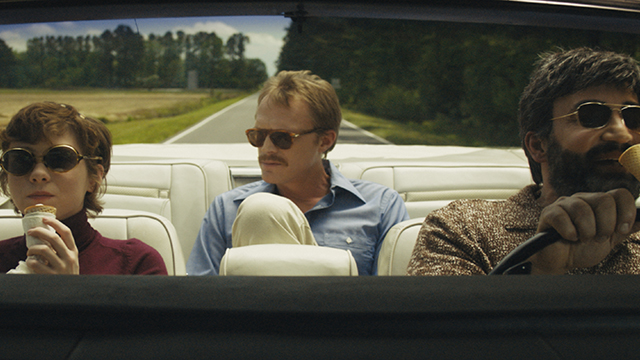It’s been five long years since Roland Emmerich rolled out the gay cinema classic Stonewall, a trip down memory lane that reminded audiences that it wasn’t the black or latino homeless youth who threw the first brick in the Stonewall Riots, but a non-descript white Twink fresh off the bus from Indiana. Alan Ball’s Uncle Frank feels almost like a spiritual successor to Stonewall in its misguided aims at addressing the homophobia of rural America through the lens of fresh-faced white teenager who makes it to New York City in 1973 to get a taste of big city life before dealing with the homophobia of her home town.
Audience surrogate Elizabeth (Sophia Lillis) is an impressionable but intelligent teenager from Creekville, South Carolina who grew up with her family’s casual bullying of Frank Bledsoe (Paul Bettany), her closeted gay uncle who teaches English Lit in New York City. Elizabeth is smart enough to get a scholarship to Uncle Frank’s college, and, upon arriving in the big city, tries to befriend him at the behest of her new, also-closeted, boyfriend. She (and, subsequently, the audience) barely meets Uncle Frank in his reality as a gay man living with his Muslim boyfriend Wally (Peter Macdissi) before Frank receives the call that his father is dead and they have to road trip it back to South Carolina for the funeral and to deal with Frank’s abused history.
By this point, I’m realizing that Uncle Frank probably started as a pilot for a series about Uncle Frank set in 1973. You see, that whole fucking set-up takes the entire first act of a three-act structure in a short 95-minute movie and so many major characters developed in the first act (Frank’s cadre of gays partying non-stop in his apartment, his delightful beard, Beth’s gay boyfriend, etc) are dropped for the road trip plot of the movie. But, the road trip is only 800 miles with like 3 pit stops: a pit stop at a cafe, a motel and a car mechanic when the car breaks down for no discernible literary reason. This road trip seemingly only serves to reinforce the idea that Creekville, South Carolina is metaphoric worlds away from New York City, but even the characters seem surprised when the Creekville sign pops up by the side of the road as if they suddenly stumbled onto a secret non-existent town that they weren’t supposed to find for another 20 hours.
Like a script written for a Screenwriting 101 class, Act III is the bog-standard funeral punctuated with occasional flashbacks to Frank’s great teenage love affair with a typically tragic ending. The funeral brings along another flotilla of plots with too sudden of resolutions and underdeveloped characters whose whole purpose is to earn Oscars by being shocked at the climactic reveal that the audience saw coming from the beginning of Act 2. The fabulous Judy Greer is southerning it up with her affinity for hairdressers and the great Margo Martindale is trying to wrench out your tears as Mawmaw (who isn’t as southern fried MeeMaw as Glenn Close in Hillbilly Elegy). But their characters are too slight to be meaningful and the resolution comes too quick and overwhelmingly modern to have resonance.
With its too sudden resolution, Uncle Frank once again reveals itself as a pilot that had been hurriedly retrofitted into a stand-alone movie. If Uncle Frank was being honest with itself, with the time it came from, and with the characters it was dealing with, Frank Bledsoe would have returned to New York City with a whole host of unresolved issues, plot lines, and characters to deal with over the course of 12 episodes a year. Elizabeth, like Six Feet Under‘s Claire Fisher, would be caught between New York City and Creekville providing both an audience surrogate to both worlds while having to deal with her own blossoming personality by coming of age in the crossover era between the fall of the hippy and the rise of disco. Uncle Frank could have been an epic long-form tale of generations dealing with the developing opinions of homosexuality in the immediate wake of Stonewall.
But, it’s not that.
While the performances are nice – can we give Margo Martindale an award already?! – and the cinematography is indie-film fine, they can’t uplift a shitty cliched plot that feels like a more hackneyed version of plots that we’ve seen a thousand times before. There isn’t the subversive joy of The Birdcage and In & Out that makes this a subversive entry into queer cinema for queer-resistant audiences. There isn’t the Moonlight-esque freshness that we are getting a new story that hasn’t been told before. The storytelling is so basic and paint-by-numbers that that I can’t even call this well executed tripe. I have no idea who this film is for, but it certainly isn’t for me.


